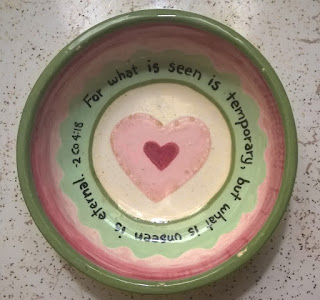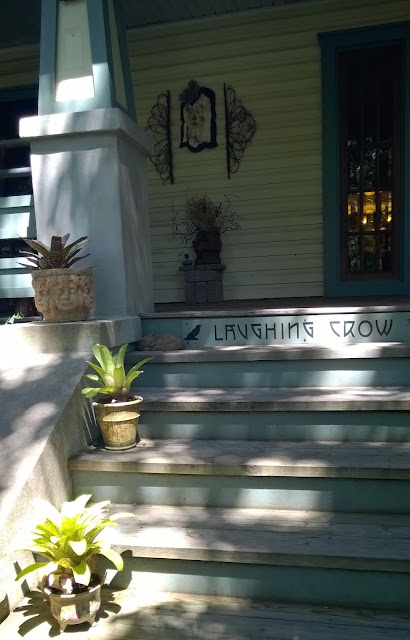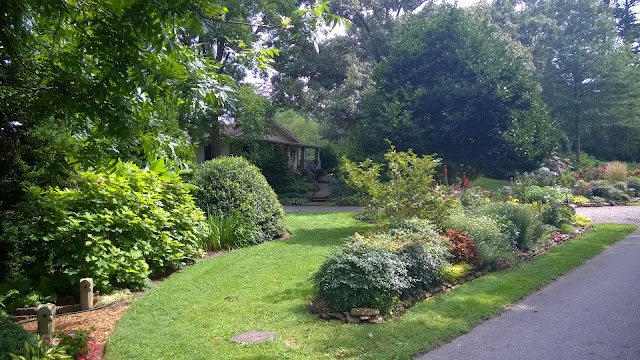“I wonder how many people I've looked at all my life and never seen.”
-John Steinbeck, The Winter of Our Discontent
I've been doing a lot of walking since July when they first discovered the mass in my colon. Initially I was driven to it as a stress release, then as a recovery recommendation, and now I'm striving to continue the habit as an investment in spiritual and physical health.
I've learned much through the process of walking in the last six months. It slows you down by teaching daily discipline in a hectic schedule. It forces you outside, prompting you to think more about other people living and working in the world around you. It teaches you about polite and crazy drivers. It acquaints you with different landscapes and neighborhoods--each with its own flavor and character.
About half the time, I listen to sermons on my podcast while walking. If you are curious, my bread and butter is Growing Thru Grace (Jack Abeelen) and Truth for Life (Alistair Begg). They are my father figures, both combinations of solid biblical teaching served up with a dose of encouragement and chastisement. If you don't typically listen to Christian programming, I don't blame you--the Christian airwaves are full of preaching that lacks grace, accuracy, or balance. It's taken me many hours of listening over a period of years to trust these two and even they, like us all, have their blindspots.
Blindspots. Recently, the thing I've noticed in my walking is how different the exact same landscape may appear once the foliage is gone and the undergrowth blackened by frost. Especially in the mountains where the terrain is ever-changing in elevation and slope, you find that you can see much farther than during the summer. The view expands, like the pulling back of a curtain.
Now, secluded places I once walked with reservation feel comfortably open, safe. When we visited Utah, I remember being impressed by this sensation. As there are so few trees, the bones of the land are upfront all year long. But in places with trees, it's interesting how the same landscape can inspire a different reaction once the leaves go. How satisfying to see far and long without obstruction. It reminds me of the verse in the psalms about God bringing us out into a spacious place.
"He brought me out into a broad place; he rescued me, because he delighted in me." Psalm 18:19
Is the same location inherently safer because of the absence of the green? I suppose to some degree that's true because there is less obstruction, but largely and practically speaking, everything is much the same. It's more my emotional impression thas changed.
 |
| The south side of Beaver Lake in late November--I can see much farther. |
In another passage, Paul alludes to of a type of veil, a barrier, that obstructs the understanding of the Jews:
"Indeed, to this very day whenever Moses is read, a veil lies over their minds; but when one turns to the Lord, the veil is removed. Now the Lord is the Spirit, and where the Spirit of the Lord is, there is freedom. And all of us, with unveiled faces, seeing the glory of the Lord as though reflected in a mirror, are being transformed into the same image from one degree of glory to another; for this comes from the Lord, the Spirit." -2 Corinthians 3:15-18
Our sense of both the heavenly and the satanic may be constrained by limitations of our "sight" in the immediate flesh. Occasionally, we are gifted with glimpses into the eternal or gather a sense of evil beyond what we can see firsthand.
Is this the Holy Spirit whispering to our eternal souls things that are greater than the immediate?
For thirteen years, I have been looking over Beaver Lake from the base of my neighborhood. It's a specific view characterized by a single white church steeple set against the backdrop of the lake, then trees, then mountains. I've wondered about this church for years--which church steeple am I looking at?
For a very long time I thought it was the Beaverdam Baptist Church, but eventually self-corrected, realizing that this church is far too far up Beaverdam Valley to appear as as backdrop to the lake. So, I concluded it belongs to a lesser unknown congregation, narrowing it down in just the last month to somewhere behind the Catholic church where we vote.
 |
| Really? The steeple is Saint Eugene's? What an anticlimax, duh! |
This is just the latest instance of the perennial gaps in both my vision and understanding. It's embarrassing how partial my understanding is of any one thing at any one time. Furthermore, I'm realizing that it's not something I can readily correct. Though I may find my blindspot of thinking in one area---the church steeple for instance--there ae five more areas where I am yet unaware of my distorted perception.
This is true in my understanding of the physical and spiritual, people and places. Deservedly, it humbles me. I'm not sure what to do about it, except to draw nearer to Him whose sight-line is eternal, without obstruction, and to recognize that my own is badly flawed.
Who knows what common truth I may discover only thirteen more years from today?








































































